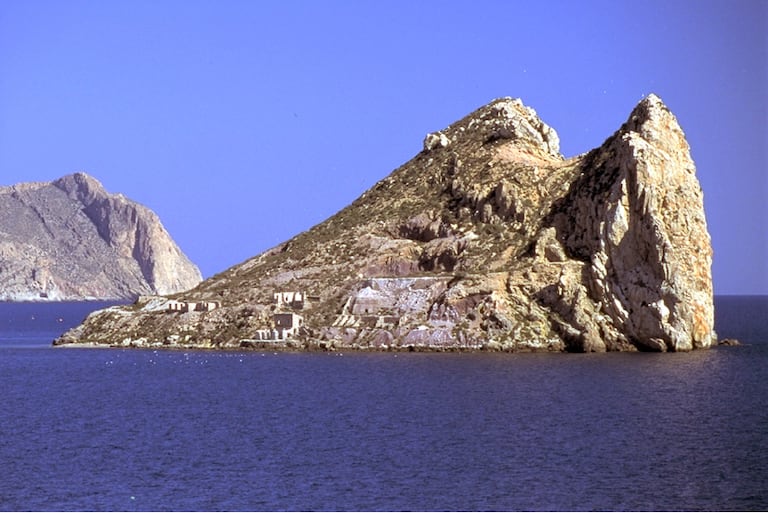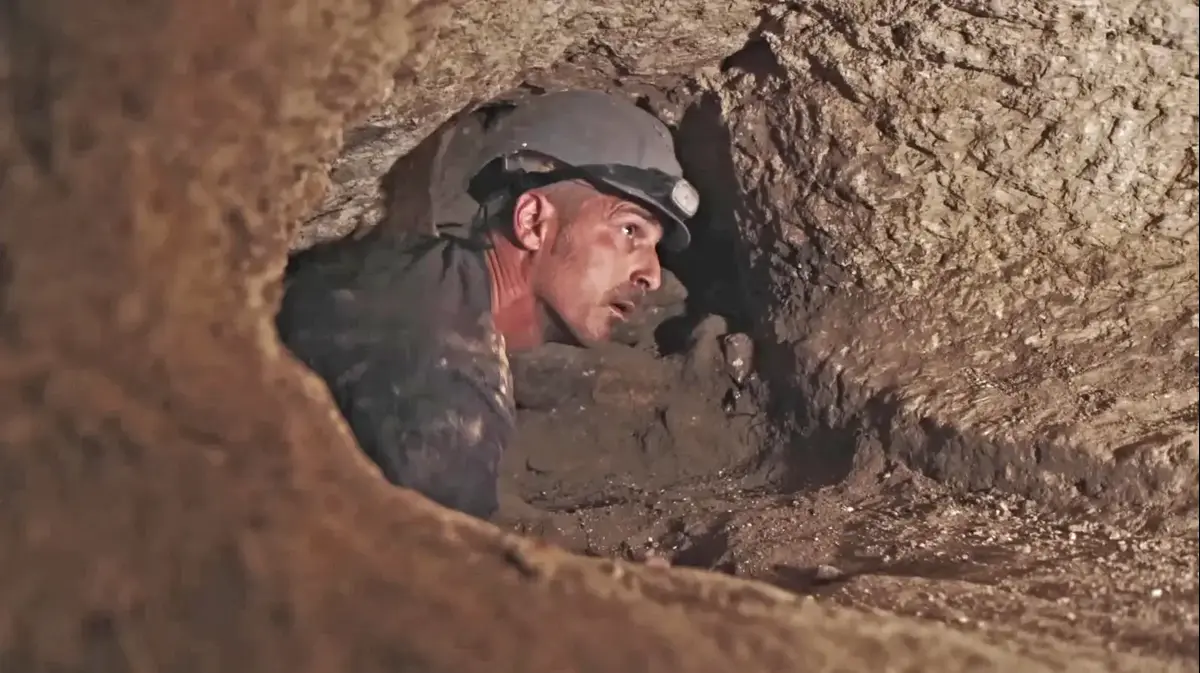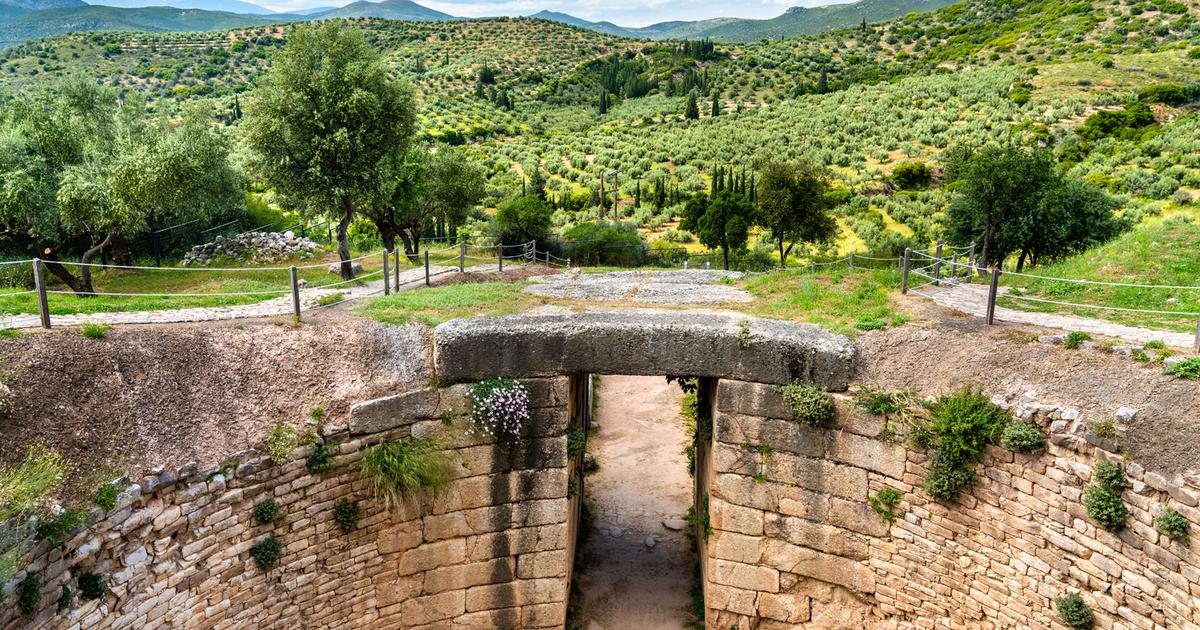Isla del Fraile (Águilas, Murcia) from where Borthwick watched the German freighters.Juan de Dios Hernández
They arrived in Águilas (Murcia) at the end of the 19th century in wooden wagons drawn by the steam engines of The Great Southern of Spain Railway Company Limited (GSSR).
They were the British engineers who were going to exploit the iron mines of the Sierra de Filabres.
The sleepers of that mining train ended right at the Hornillos jetty, where German, English and neutral-flagged ships filled their holds with the precious iron cargo that would be indispensable in the imminent First World War.
In front of the dock, the small island of the Fraile;
and on the islet, the Scottish nobleman Hugh Pakenham Borthwick, with his servants.
One of the women who tended his house recorded the daily life of the aristocrat on tape in the past eighties, who arrived on the island in 1912 and left it in 1920, shortly after the end of the Great War that destroyed Europe.
Borthwich never paid attention to the archaeological environment he was standing on, which allowed the site to be saved from looting.
And that, now, the Area of Archeology of the University of Murcia and the Archaeological Museum of Águilas excavate in search of an authentic treasure: possible remains of a monumental building, coins, a Roman settlement and an Islamic necropolis with a child burial.
Borthwich was never interested, because he was busy with his own mystery.
He was only looking at one place: the dock with the iron-laden ships.
He was writing down the names of the ships and their flags.
María Abellán Ruiz, then about 12 years old, her mother and grandmother were three of the assistants who looked after the house that Borthwick lived on the island.
José Asensio, teacher and collaborator of isabadell.cat, is María's grandson.
In 1983, he recorded what the old woman remembered about the Scotsman's life.
“It had no relation to the English colony.
He was her newspaper, her correspondence… She was always reading.
He received many letters.
But he never kept them.
I destroyed them after reading them.
The newspapers did keep them.
He went to bed very early, always with his revolver under his pillow, but he was not afraid of anything.
He never explained to us why he had the gun… ”.
The Scotsman who inhabited and preserved the treasure islet
Historians, witnesses and archives agree that the spy alerted his liaison when a German ship or a neutral country was loading iron ore.
The alert operation was well designed because, after the warning, the cargo ship was sunk by British submarines.
"Although the gossip points it out," Asensio clarifies, "as a deserter from the war, the truth is that his mission was to spy on the Germans from their privileged situation on the island of the Fraile."
In 1992 the writer Juan Navarro, in his book
Traces of the Past
, recalled that "Don Hugo, as the aquiline people called him, settled, in addition to on the island, in the town, in two houses that still exist."
The British population in Águilas, in the early twentieth century, was very important and their way of life had permeated the neighborhood.
In fact, the English created the first local football team (where Borthwick played), introduced rugby and tennis, and even drove the first motor car through the streets of the township.
They also brought their own architecture, their engineering and, of course, their language.
"At that time there were neighbors in Águilas who could not write, but who spoke English due to daily contact with foreigners," explains Juan de Dios Hernández, a municipal archaeologist.
The island - just 100 meters from the coast - was owned by Scottish banker John Gray (Juan Gray), who was sold to him in 1910 by British Army Lieutenant Colonel Alexander Borthwick.
And this, with the excuse of the exploitation of a quarry on it, transferred it to his son Hugo.
Young Borthwick, thanks to his family's fortune, had studied at Oxford, where he was recruited by the British secret service.
At age 25, and with the island in his name, he was in Águilas ready to fulfill his mission.
The Dutch writer Jacqueline Sorel, who is preparing a play about him, remembers that he was assigned as a spy for Águilas when the Germans discovered his predecessor.
“There was an incident with a German submarine in Cartagena and the agent preceding him was discovered.
Let's say it was no longer good for anything and the secret service had to change men quickly, "he explains by phone.
According to the testimonies of the time, collected by Asensio, “at a time when poverty was extreme in Águilas, Don Hugo represented the stereotype of an attractive young man.
Tall and blue-eyed, he smoked a pipe and was always dressed in black, although sometimes he was seen in a spotless white suit and hat.
His clothes were washed and ironed every day because of his obsession with cleaning ”,
He was always very kind to his employees - he had bodyguards, a driver and servants - and he tried to teach his servants to read and write, even giving them notions of English.
Although he hardly related to his compatriots in public, he did receive visits from different Brits instead.
“People very well dressed, with jewels and hats, something completely unimaginable for the residents of Águilas at the beginning of the century.
It was a real
shock
”, explains Juan de Dios Hernández.
“He was a good man,” María Abellán recorded in 1983. “He was very sorry for poverty, he loved children and distributed large amounts of money to them for the time.
Sometimes he gave them 15 pesetas, which was more than what some of his servants earned.
Thus, the word of Don Hugo's humanity spread and many poor people came to ask ”.
Borthwick disappeared as he arrived: without warning.
He married in England and upon his death in 1950, his wife visited Águilas and tried to contact his servants, but many had already died or did not know of his arrival.
“Don Hugo deserves”, says Asensio, “to be present forever in the aquiline gazetteer.
I would like the viewpoint of the Hornillo [the jetty that the Scotsman kept an eye on and that is going to be restored shortly] to bear his name and that the houses on the island where he lived be restored and an exhibition is also created there permanent".
Everything, for the man who guarded the dock and who did not plunder the archaeological treasure (remains of Roman and Islamic times) on which he lived, the island of the Fraile, which now causes the admiration of archaeologists.









